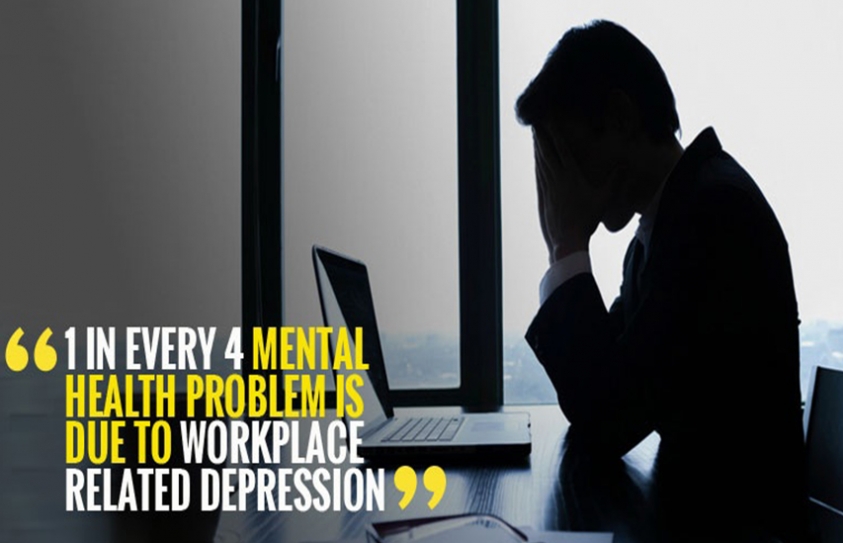
Stop Killing Your Grandmother For The Nth Time!
by Sukanya Sudarson July 18 2017, 6:24 pm Estimated Reading Time: 4 mins, 40 secsA recent tweet by a web developer, Madalyn Parker about her CEO’s response to her email has sparked an important conversation about mental health. Parker, who suffers from chronic depression and anxiety, had sent an email to her team saying she did be off two days to focus on her mental health. Her CEO Ben Congleton at Olark not just appreciated her but thanked her personally for reminding him of the importance of using sick days for mental health.
While the world is opening up about the need for ‘mental health’ breaks in a competitive and sapping work environment, talking about mental health is still a taboo in India, let alone taking a day off to focus on mental health. People have often killed their grandparents or a distant relative time and again to take time off from work. Talking about depression or their struggles with mental health issues still makes a person’s colleagues or employers squirm in their seats.

A study conducted by 1to1Help.net, a professional counselling company, on ‘Mental Health Status of Employees in Corporate India’ found that one out of every two employees in corporate India shows signs of anxiety and depression. The study covered 6000 employees across organisations in different cities who voluntarily completed the depression scale. The findings were shocking – 80 percent of the respondents, who exhibited symptoms of anxiety, and 55 percent with symptoms of depression, were going through it for over a year before seeking professional help.
Workplace tension has been identified as one of the leading causes behind the deteriorating mental health of individuals. Extended working hours, tight deadlines, fierce competition, heightened expectations, long jam-packed travel from home to the workplaceand lifestyle issues are all factors that contribute to workplace-induced mental health problems. Prolonged ongoing stress due to personal and work contexts were also identified as triggers for mental illness.

“Depression is an often-misconstrued word because of its use in day-to-day conversations to express a bad mood”, says Dr. Mohan K Isaac, former HOD, Department of Psychiatry, NIMHANS. And media has often projected mentally ill people either as aggressive, violent and harmful or sober, reclusive and suicidal. It is vital for us, today, to understand that any normal human being can suffer mental illness and it can be of varying degrees. Understanding the difference betweenmood swings experienced every day and the symptoms of clinical depression would help employees and employers eliminate the stigma associated with mental illness.
Signs to watch out for:
- Absenteeism, more than usual sick leave
- Physical ailments
- Poor work performance
- Accident proneness
- Tension and conflict with co-workers
- Alcoholism
- Harmful substance abuse
- Suicidal ideation

Protecting the Mental Well-Being of Employees:
How can we make workplace healthier for employees to feel safe and contribute better given such a stifling environment?
Be open/ reduce stigma: Employees feel encouraged to talk about personal struggles if organisations are more open and unbiased about mental health issues.
Support people with mental health conditions: Companies can help employees with mental health conditions to stay at or return to work gradually.
Make managers aware: Managers hardly care because they are not aware themselves. Organisations can provide sufficient inputs to managers so they are more aware of any distress in their team, and equip them to handle such situations sensitively.
Promote positive workplace culture: Make the organisation a place where people feel good about coming to work and where everyone feels encouraged and supported.
Zero-tolerance to discrimination: Protecting employees from discrimination and bullying (based on gender, religion, caste, class or health condition) encourages a diverse workforce and ensures equality and fairness.
Help employees voice their grievances:Companies should provide outlets for employees to voice their grievances and deal with their issues, and maintain confidentiality about the process.
Reduce and manage stress/other risk factors: Organisations should keep in check the various job stressors that include uncomfortable working conditions, heavy workloads, unrealistic deadlines, poor communication, lack of control over the work process and sheer monotony.
Run wellness campaigns:Companies can run wellness campaigns by screening for common mental illnesses (depression, suicidal behaviours, substance use problems, etc.) and promote health through yoga, in-house gyms, retreats, team-building exercises and other methods.
Have a workplace policy on mental health:Companies would do well to address mental wellness at the workplace through a clearly articulated workplace policy on mental health.
Promoting mental health in the workplace benefits everyone: employees, managers, business owners and organisational leaders. Organisations can have financial benefits, increased productivity and reduced sick pay by looking after the mental well-being of the employees. Employees feel good about working in such an organisation and are motivated to contribute better. A mentally healthy workplace enables employees to handle their work-related stressors well and of course, it will stop employees killing their grandmother for the nth time!!
References
Bhattacharyya, R., & Vijayaraghavan, K. (2016, Jun). 46% of workforce in firms in India suffer from some or the other form of stress: Data. Retrieved from http://economictimes.indiatimes.com/jobs/46-of-workforce-in-firms-in-india-suffer-from-some-or-the-other-form-of-stress-data/articleshow/52696795.cms
Choudhury, D. R. (2017, Apr). One-fourth mental illness arises due to workplace depression, suggest experts. Retrieved from http://indiatoday.intoday.in/story/depression-mental-health-wellness-workplace-long-hours-lifest/1/923794.html
Let's Talk: Work Stress and Workplace Depression. (2017, Apr). Retrieved from http://www.georgeinstitute.org.in/events/lets-talk-work-stress-and-workplace-depression
Nair, D. (2016, Sep). One out of every two employees in corporate India suffers from anxiety and depression. Retrieved from https://yourstory.com/2016/09/depression-corporate-india/
Rajgopal, T. (2010, Sep-Dec). Mental well-being at the workplace. Retrieved from www.ncbi.nlm.nih.gov/pmc/articles/PMC3062016/
Tips for creating a mentally healthy workplace. (2017, Jul). Retrieved from https://www.headsup.org.au/creating-a-mentally-healthy-workplace/getting-started/tips-for-creating-a-mentally-healthy-workplace




-173X130.jpg)
-173X130.jpg)
-173X130.jpg)
-173X130.jpg)

-173X130.jpg)
-173X130.jpg)
-173X130.jpg)